TNG Worklife is a podcast and ongoing conversation about the work-life experiences of the transgender, nonbinary, and gender expansive communities.
You can find us on Apple, Spotify, and Instagram.
This podcast is always free, and if you enjoyed it, you can support the work by subscribing for as little as $8 a month.
About Kelly the Barber
Website: https://kellythebarber.com
LinkedIn: https://www.instagram.com/kellytheirbarber
Credits
Opening music - Abstract Fashion Pop by QubeSounds
Closing music - Where the Light Is by lemonmusicstudio
Episode Transcript
[upbeat pop music plays]
[00:00:00]
Kai Stowers: Hello, and welcome to Season Two, Episode Four of TNG worklife, a podcast about the experiences of the trans, nonbinary, and gender expansive communities in the workplace. This season, we're focusing on the strength we gain through community and partnership. You can join our community by signing up at TNGworklife.substack.com which will deliver each episode, including the full transcript, right to your inbox.
Today, I'm speaking with Kelly the Barber, whose mission is to provide gender affirming haircuts. Our wide ranging conversation touched upon the practicalities of becoming a barber, healing from the rejection too many of us still experience from our families and churches, and how allies can better support us. I'll just say that Kelly dropped some serious wisdom in this episode, and I'm really excited to share it with you.
Hello, Kelly. Welcome to the TNG work life podcast. So happy to have you here today.
Kelly Hensley: [00:01:00] Thank you so much for having me. It's good to be here.
Kai Stowers: Yeah. I've been really looking forward to this conversation. I know that you are a barber and you've been building community for a while and we'll certainly get into that. But I always like to start by just getting to know my guests as a human being first. And, um, maybe we'll just kick it off. When you were a kid, what did you want to be?
Kelly Hensley: I always love this question because I find that oftentimes, , you hear of the kids that want to be the doctors or scientists. I wanted to be the first woman in the NFL. And I mean, I've always been a husky kid. But, I'm definitely not tall. I'm 5'4 I played tackle football as a kid growing up with.
Kai Stowers: Can you tell me a bit about your career journey since you aren't currently playing in the NFL? Correct.
Kelly Hensley: Correct. So I stopped playing football when I was like 10 or 11, but, my first career in my early 20s I was a wilderness [00:02:00] guide. Later on I met my friend who was also a hairdresser and I wanted to do what she does.
For one, I wasn't very scholastic and I didn't, Want to complete college? I like the idea of certificate programs because they were more tangible for me. And I chose to go to a community college with a cosmetology program just because it was so much cheaper to go there and
I had heard from people, don't go into debt if you don't have to. It was in school that I realized how strangely strict it was, and I didn't have the words for it, in the gendered world. Meaning, I would get sent home from school if I wasn't wearing make up and my hair
wasn't done. If I wore socks that weren't black socks
Kai Stowers: This is before you transitioned.
Kelly Hensley: Correct, this is before my transition,
and I wasn't opposed to wearing makeup, and even still, I can wear makeup every now and then, it's just such a strange thing being 26 years old and being told by your teachers to go home because you're wearing white socks.
Their standard of [00:03:00] beauty reminded me of Frenchie in Grease Lightning and a lot of the girls that were there, Love that kind of,
and I found it to be like, sure, I'll slap some really cheap makeup on my face,
just to
like, be checked off in the attendance, but also, I have a drag queen persona, her name is Champagne Longbang, and she's campy, but, I do like makeup. I don't love wearing it every day, and I don't necessarily like the standard of making people, present a certain way, especially when I definitely didn't want to.
Even with the socks. With the socks. I'm like, what the hell?
Kai Stowers: So you made it through cosmetology school. You got what you needed out of there. Tell me how you launched your career.
Kelly Hensley: So I had met my girlfriend at the time in beauty school. Her mom, Had this wonderful hairdresser in the Marina in San Francisco, and she happened to, ask Bob, Hey, Bob if there was a chair available to rent and [00:04:00] he set up a really good deal where I started working there for very inexpensive understanding that I didn't have clientele at
all.
I signed a contract that said eventually in a year I'll be paying X amount of money I was doing mostly long, I guess to speak in an old fashioned way long women's haircuts, cut and color
Kai Stowers: Right. Because the Marina has a certain
vibe, right?
Kelly Hensley: Yes, it's a highly gendered vibe. We'll call it
a generally cis vibe. Sometimes it's referred to as Orange County of San Francisco, just to give you a little idea of what was going on.
So that's how I started my career and then I moved away. My ex wife and I thought we wanted to be suburban lesbians. I moved away to Wisconsin where I became a barber out there.
The community there was very nice, we'll say that. I wasn't inspired out there. Moving from San Francisco to central Wisconsin,
Kai Stowers: It's a big culture
change,
Kelly Hensley: yeah, and the winters are long and this is a slow, way of life. Trump [00:05:00] was elected while we were out there.
So I looked at her and said, do you want this president while living here? And also, do you want another winter, which is on the horizon? She said, no. So we hopped in our Prius and made our way back to the Bay area. I ended up going back to school because here in the state of California, barbering is a separate license. And I knew I wanted to do shorter haircuts and learn how to use a straight razor. So I got my barbering license on top of my cosmetology license and started working in what we'll call a regular barbershop.
But there was a lot of shady stuff going on in the barbershop. And this is before my transition still. The other barbers that were working next to me were outwardly disrespectful and wouldn't, even say good morning to me, even though
I was the one opening the shop.
It was very hard. But by me saying yes to every walk in that they would say no to,
for whatever reason, oftentimes a woman wanting a shorter haircut or a queer presenting person, period. [00:06:00] They would tell them, no, I don't have time. When this
was back when paper bookings were there and all of their books were on the front desk and I was able to see that they actually did have time. So I said yes to everyone I could because money is key.
I would come home with a huge amount of cash, give it to my wife and just cry and just feel, just
think that's horrible
Kai Stowers: yeah.
Kelly Hensley: Anyway, by me saying yes to, the clients that they would say no to and the clients that I would gain from that actually Liking the
experience that you have with me in the chair.
Kai Stowers: Oh, I bet. That must've been a huge relief for them
Kelly Hensley: and sure I can cut hair very well . But what I'm hearing more so is that the clients wanted to come back because they felt safe. The more I listened to my clients about their previous experiences with other people, whether it's barbers or other Hair stylists in salons is that they were not getting the haircut that [00:07:00] they wanted,
period.
They would come in, oftentimes apologizing for how they are with their hair and I'm like, this is your hair. It's You get to wear it however you want to.
Kai Stowers: Yeah. And that's something that happens when we're not part of dominant culture. We absorb their norms, their rules, and then we judge ourselves for not quote unquote fitting in. So it makes sense that people with all of those experiences would be apologizing for just being who they are.
well and it's the huge marketing
Kelly Hensley: tactic that I think more than just the beauty industry has, and I'm talking across the trans or cis line. People think they are wrong with their hair. Because the industry, L'Oreal as the umbrella, says, if you have curly hair, you shouldn't be washing it too often. And so people come in saying, how much should I wash my hair? And I put it back on them saying, what feels best? Instead of saying, well, if you need to use this conditioner or you're doing [00:08:00] it wrong, or if you're not combing your hair in this way, then you're awful.
There's a lot of shame in the industry about how we are with our hair and how we present, and especially how trans people get pushback from whoever's cutting their hair. And so when they come and see me, oftentimes they are, of course, anxious, which makes sense.
And how scary is that to have gone through this before, and maybe multiple times before, and if you're someone like us, where you're gender expansive, and for me, assigned female at birth, and just wanting to
not look like a
woman.
Kai Stowers: Yeah.
I grew up in Texas and my first job out of college was in New Jersey and these are both States at the time that really liked big hair. I didn't understand I was trans back then, but , I knew I didn't want big hair, but there was no way I was leaving salon without big hair.
And so I would just immediately go home and wash all of the product out of it.
Kelly Hensley: And of course, like, you're [00:09:00] not going to say anything while you're sitting in the chair, like, don't do that.
, I would sometimes use the excuse of I'm going to go to the gym right after. So that's how I got around it.
Kelly Hensley: Yeah, smart. Yeah, lies. Lies always work.
Kai Stowers: Yeah.
Yeah. And you're talking about the really tough toxic experiences you were having in the barber shops. What was your next step?
Kelly Hensley: I moved from that shop to a woman owned shop that was, safer in
general. It just wasn't specifically safe at the time, for trans people to
be there.
Meaning that, trans fems would be misgendered constantly. ,
and there wasn't a empathetic view from the ownership there,
as much as I'd hoped for. Because of the stories of my own clients, in their own gender curiosity, I learned about myself that I am non binary, I thought I was, well, it's just a new way to describe my tomboy ness where I've
Been in [00:10:00] between all of my life.
And then seeing them experience
joy, what I guess
we'll call euphoria, after they start their therapeutic journey. So I learned a lot about myself and I wanted to create a safe space for people like me and them. So, out of the handful of gender expansive clients that I had, they were asking can they give me reviews and I said yes, only five stars. I'm just kidding. Um,
Kai Stowers: But you know, five stars
are
nice.
Kelly Hensley: and, but you know, but basically, yeah, please. , I was really terrified to, to, ask them this, but if they were available, can you use keywords in your review?
So by them using key words of their identities, their queerness, in their reviews, Now with all the search engines, people type in queer barber, and my name is one of the first ones that comes up in the South Bay.
It was really scary for me because [00:11:00] it's a very vulnerable place for me to be, especially when I wasn't completely
okay yet with my
own
transition.
Kai Stowers: Because that takes time.
Kelly Hensley: Yeah, it definitely takes time.
Kai Stowers: Yeah. And it's also pushing back against all the things that we've been taught and absorbed about the way to succeed is to fit in. The cosmetology school was an extreme example of that. But these are messages we've been getting all of our life. You know, if you're a girl, then these are the ways to be.
And if you're a boy, then these are the ways to be. And you were starting to lean into, wow, if I can start to reach for who I am authentically, that's going to help me reach people who need a space that doesn't exist yet.
Kelly Hensley: Yeah, and so in January of 2020 before the shutdowns I moved into my own studio shop in Willow Glen
Kai Stowers: and that's in San Jose.,
Kelly Hensley: That's when I really started to get more queer clients in my chair. And that's when I started my physical transition
Kai Stowers: Mm hmm.
Kelly Hensley: when I went on HRT and I also [00:12:00] had top surgery all in the same year, which seemed very fast for me.
Kai Stowers: Yeah. And I'm thinking my own transition too, like, it seemed very fast but at least for me, there had been things cooking in the background for like years and years .
And so there was like a moment where I was like, oh, I am trans. And then I could start moving forward, making decisions. But on the other hand, there were ways I had known that in ways I just suppressed those parts for a long time. So, I don't know, measuring a transition from the day that you were able to come out.
It doesn't always feel accurate.
Kelly Hensley: very true. And I only worked eight months of 2020 because legally I couldn't.
And because of that, I was like, Ooh, I got to get my stuff done now. Stuff meaning surgery,
stuff meaning therapy, so that in a way was helpful. I don't get paid time off.
Yeah. And so we've been talking about your own journey, your own gender identity. How does being trans or non binary help you create an inclusive and welcoming [00:13:00] environment for our community?
Kelly Hensley: Sure. I think it's, the shared experience.
In my own transition and in my own gender journey, I've been able to pick apart how traumatizing the beauty industry has been for us, and dismantling it.
In my consultations. I want to speak more objectively about hair
length and how it could, I often use the words, could present in a certain gendered way. Meaning, during my consultation if people are like, I don't know, do whatever you want. And I was like, cool I'm gonna shave your head down the center and they're like, hmm, maybe not that.
I'm like, so you do know what you want. I'm like, let me find a boundary
Kai Stowers: I like how you start with something you're like, it's going to be way out of bounds.
Kelly Hensley: Yeah, exactly. But the wonderful thing about our community is sometimes they're like, I love it. Let's do it. And I
was like, great. Or I had, I had a person come and sit in my chairs asking for the quote, ugliest haircut of their life. And I was like, I love this.
So there's a playfulness.
Kelly Hensley: [00:14:00] Yes, sometimes there is a playfulness, and I also really love the consultation. If they're like, I don't know, do whatever you want, and I was like, okay, well, let's talk about, do you want to go short enough for your short haircut, To see a little bit of skin
and they can say yes or no And if they say no, they want it a little bit longer.
I'm like, okay Well, let's talk about longer because sometimes when people wear longer hair That's maybe not necessarily cut up and over their ears It could present more feminine. I use the word could
Kai Stowers: Right.
Kelly Hensley: Because gender is so expansive.
Kai Stowers: And I just feel the space in this rather than being every long cut is a women's cut and every shortcut is a men's cut. There's so
Kelly Hensley: yes
Kai Stowers: between there that it sounds like you're exploring with your clients.
Kelly Hensley: So much Absolutely, and I feel like right now, people are coming in asking for quote, longer androgynous haircuts,
and I say, okay. Well, do you have pictures? And if not, that's fine too. If they have pictures, I usually give them what I call [00:15:00] verbal receipts of things that I see in the picture. And you can tell me yes like that, or maybe not like that. Because my goal is to give you the haircut that you want, and I can do a variant of things for you. that the picture may or may not show.
I'm not here to be like, I'm going to. give you this exact haircut that's the picture that you show me, but rather you're going to wear it and it might present a little bit differently.
Is that okay?
Asking permission is, I think what I've heard from my clients is the safest part of it.
The first thing I do is I drape people. I ask them, is this okay around your neck?
can you imagine sitting down and be like, alright, now that I'm going to strangle you for 45 minutes?
If it's not comfortable, if it's a sensory thing, just let me know because this experience is for them.
I can hopefully continue to learn how to create a safe environment. And I want to pinpoint that it's not about the haircut itself.
Kai Stowers: Yeah.
Kelly Hensley: What I'm here to talk about is more so the soft [00:16:00] skills involved with creating a safe environment
Kai Stowers: You know, and I'm hearing like all those soft skills that you've put a lot of thought into. You've had a lot of experience with our community. What are some of the things that somebody who wants to be an ally, especially if they're in the beauty industry, what advice would you give them?
Kelly Hensley: I think I would give the advice of understanding what curiosity breaks down to. Asking curious questions and curious to me means without judgment
Kai Stowers: I love that you're using the word curious. I used to lead mindfulness in one of my former organizations and I would sometimes talk about compassion and, you know, these are scientists and some scientists were great with it and some scientists are like, that is just too squishy for me.
I don't like that word. I'm not going to do it. But another word for compassion is curiosity. Cause if you're really curious about something, like you just said, that judgment drops away.
Kelly Hensley: I love that. I didn't know compassion and curiosity were attached.
That's cool.
Kai Stowers: Yeah.
Kelly Hensley: [00:17:00] To get myself to what I hope to be as like a purely curious person i've had to take care of my own discomforts meaning reframe my own professional trainings of what things should be like.
For an example, sometimes I hear, stylists or barbers say things like,
No, you don't want to wear your hair like that.
Or questioning them, are you sure you want it like that?
Instead of using the word, are you sure? Because I do want to make sure I'm doing the right thing.
I usually give what I call verbal receipts. SoI'm hearing that you want your hair tapered in the back, but you want a little softness in the front. So we're gonna leave the sideburns a little bit longer, because I'm hearing you want to present androgynous, but a little bit more feminine. Is that correct?
And then they're like, yes, although maybe blah, blah, blah. And then if there's a reframe, and I was like, hmm, maybe you do want it punching your ears a little bit. Is that correct?
And then they're like, yes. And I learned that from active listening and from my own [00:18:00] therapy.
Kai Stowers: Amazing what these skills how applicable they are to life in general.
Kelly Hensley: yes
Kai Stowers: Maybe you could say more about your drag persona. How does she fit into all of this?
Kelly Hensley: She has always fit in. Her name is Champagne Longbang and she came about when I was living in San Francisco with my roommate, Cameron, and we were teaching at a swim school up in the city, and we had the swim teachers over for haircuts. We were drinking really cheap champagne from 7 Eleven, and we ran out of champagne, and we started clapping, because that's what we do, and we're all swim teachers clapping, saying, champagne. And then I asked the person in my chair, do you want to try a long bang or short? And then we started saying champagne, long bang. And my roommate was like, that's your drag persona.
That's how she came about. Then when I went to beauty school, there were times during fun Fridays or whatever that I would show up in drag.
Champagne Longbang. She is the embodiment of an even more [00:19:00] eccentric version of my mom, to tell you this, and my mom is eccentric for
sure, I was taught to be feminine in a certain way, so I'm going to make it super campy, I'm going to amplify effervescence mean, which is very champagne ish, right?
Effervescence. Just like the campiness and the comedy of, femininity. When I lived in Wisconsin with my ex wife, there was a very small gay bar in town. And for Halloween, I won second place on stage for Champagne Long Bang from San Francisco, California. I won a $50 bar tab that I definitely did not need. And that was, the last time I had performed as her, and so this last Halloween, I dressed up as Champagne Longbang for the first time with my beard. I got to wear a full lash and a full beard like I've always dreamed, and she makes more sense to me now. Not that, being pre transition didn't make sense, the understanding was less complete. So I like that sort of taps into [00:20:00] the non binary ness. I get to use all the pronouns he, I'm he, they, and, then Champagne, she, her, and, that, affirms my transition as a totality and of my story in general.
Kai Stowers: Listeners hear the audio, but we get to see each other. As soon as I bring her up, I just see how much you light up and there is an effervescence.
Kelly Hensley: You see my hands go up by my face. Yeah,
that's basically the Champagne look like my pinkies are always out and everything is up here, like arabesquing, if you will.
Which also equates really well to my gay boy ness. Um, affirming all of my sexuality too. I'm like, here I am. Just the gay boy is here. Yeah. is up.
All right. Pinkies are up.
Kai Stowers: All right. We've been talking about where you've been and who you are now. But I'd love to hear you talk more of the ways that you hope to grow your business
Kelly Hensley: my favorite thing to do. Other than cut hair is to connect people with [00:21:00] resources and help for especially queer and gender nonconforming people in the community. And luckily here in Santa Clara County, we have, a government funded behavioral health service center called Q Corner and also Office of LGBTQ A ffairs. and I've been able to work alongside them of direct My clients that need resources and connection to get help through the county what I hope to do in my future are several things. I hope throw a another barbecue a couple of years ago. I threw a. Grillin and chillin with Kelly the Barbecue. it was in 2021, right after the pandemic. People were feeling very separate and 80 of my clients showed up to this picnic.
One, I would like to do that more often because it's been really, it was really cool during that time to see my clients who were our queer families with young kids. They didn't know each other and now they have really good friends because of that. I got to see the lesbians play cornhole and drink beer and make new
[00:22:00] friends. The young K pop non binary teenagers find each other and now they're friends. connecting people who don't feel like they have a community that's been a really important thing and I also had a Thanksgiving and Christmas here at my place
Kai Stowers: Yeah, and the holidays, I mean, they're hard for a lot of people, but especially in that queer, trans, gender expansive community, a lot of our families don't come along in our journeys, so having that space is so important.
Kelly Hensley: Because of my own journey, we'll just say my holidays were freed up.
And let me tell you, this holiday season was the most joyful holiday season I've had in a while. Because We are all here to just hang out and connect and have the holiday seasons that we hope for which has nothing to do with pushing away our queerness nor hiding it, but rather just loving each other and having a good time. And on top of that, I would also like to, I think, depending on how finances happen, I would like to have [00:23:00] a bigger barbershop slash salon slash community center, where I can have after hours or before hours social groups like youth groups or sober groups, for the queer community.
Kai Stowers: It sounds like you've landed in a really good place. You've built your business, you've built community around it. But if you were to go back to when you were really sitting with all of that loss of family and your old way of life, what was it that you most would have wanted to hear.
Kelly Hensley: When I came out and my family asked me not to come around from the holidays because they're, protecting the kids against me and my
life choices. Those were the exact words. what my parents did say was, Kelly, what did you expect?
And I actually had a really good think about that, and what I came back saying to them what I expected is the same application of quote God's love. Okay. I grew [00:24:00] up evangelical in the church
and their perception Has made it so they are not capable of what I once knew as unconditional love. they have really harmful beliefs. What I hope for is maybe with exposure And my own healing journey, which is separate. They are hopefully able to see that I am the same person. What I think has bridged the gap for me and my parents is to apply what
calling Christianese
to talk about my life now because they want everything to relate to God even in conversation you what I would say to them is mom and dad I can't wait to tell you about The joys that God has given me within my transition.
Kai Stowers: Right.
Kelly Hensley: Whoa. Because if all good things come from God, and I'm feeling wonderfully centered and balanced more so than ever, how could this be so [00:25:00] awful?
And I also say things like I'm able to serve God now that I'm more grounded in myself. And that has been able to bridge the gap between mom and dad, because what they fear is that I've become a Satan worshiper
Kai Stowers: Right. Right. Which, you know, you're like, that's
Kelly Hensley: you know,
something ultimately scary, which is like, yeah, sure,
Kai Stowers: You're like, I'm a little too busy cutting hair.
Kelly Hensley: I know, I'm so busy, but I guess this is me worshiping Satan, yeah, um, with all the rainbows around, so it's taken a lot of reframing within my life and questioning what the hell just happened. Like with my belief , and the safety I used to feel in the church world, and all of a sudden that's taken away because of their perception . So,
Kelly Hensley: Using their verbiage I think has been helpful,
Kai Stowers: I'm just thinking too, cause I grew up religious, I grew up Catholic and in high school I was like, this church is not a good place, a safe place for me, but there was a huge [00:26:00] loss that came along with that. And one of the things I think about is how, religion is owned by certain groups.
But faith, and our connection to God, or something bigger, or however we understand faith, that is something that belongs to us. And that is how I've made some sense of that rejection. That we experience, even though, if you really listen and most traditions that I know of, I might not, be speaking for all of them, but most traditions really do talk about, God is love and then you run up against in our human institutions, like, Oh, here's a hard limit on when you are no longer loved.
You're like, how do you reconcile that?
Kelly Hensley: and I don't know if there's One easy way to reconcile it,
Cause it, often times it's not reconcilable.
How does one make sense of that? And to me, it's just having a greater perspective, meaning a distance away from being in that world to see what the hell just [00:27:00] happened.
And now it just looks like government and church and suppression in all the ways. And I was like, Oh my God, that's what they're believing.
I don't want to say the inability to question that, but more of how scary it is to be inside of that
Kai Stowers: Right. Right. Cause if you are inside of the system and you do the things, then you are going to be safe and loved and successful and you have community.
Right.
Kelly Hensley: yes.
And if you question it, it means you're questioning God. In Christianity you do not question and what i'm learning is it's for control.
Kai Stowers: So I'm hearing that there's had to be a lot of healing and a lot of understanding, you know, if you're not inside this particular faith, what is your relationship to God? What is your relationship to community? , where do you see that you've landed?
Kelly Hensley: The more I apply comfort to myself and my transition the more that gets to be reflected onto my business and what I do. How we are with people around us has everything to
do [00:28:00] with how we are inside of us.
Kai Stowers: Absolutely. All right. Um, any last words you'd like to share?
Kelly Hensley: My hope would be, about curiosity about what people might be going through
Which doesn't necessarily mean that we need to know all of what they're going through to be able to treat them well and with respect,
Kai Stowers: There's so much oxygen around that.
I know you're interested in continuing to grow your business and community and speaking and being on stages, where can people find you?
Kelly Hensley: Yes. My website is kellythebarber.com, and if you scroll down to the very bottom of the website, there's a little spot where you can ask me direct questions. So, kellythebarber. com.
Kai Stowers: Well, thank you for being on the podcast today.
Kelly Hensley: Thank you so much for having me.
Kai Stowers: Thank you so much for listening to season Two Episode Four of TNG Worklife, an independent podcast produced by Kai Stowers LLC. This podcast is always free. And if you enjoyed it, you can support the work by subscribing at [00:29:00] TNGworklife.substack.com for as little as $8 a month. Your generous support goes towards production costs. If you would like to learn more about my coaching and consulting work, you can contact me through my website, kaistowers.com.
Finally, I wish that each of you find grounding, connection, and abundance in your lives.

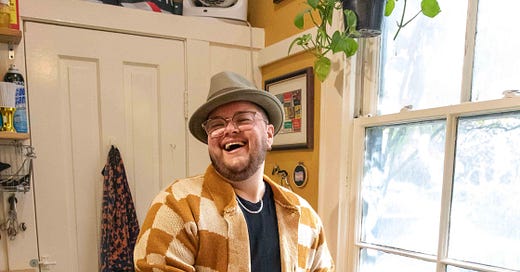






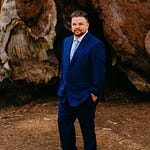
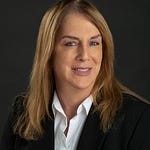

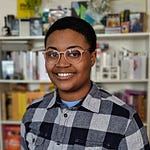
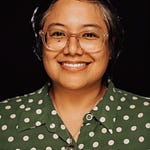
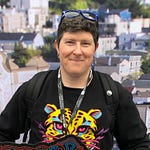

Share this post